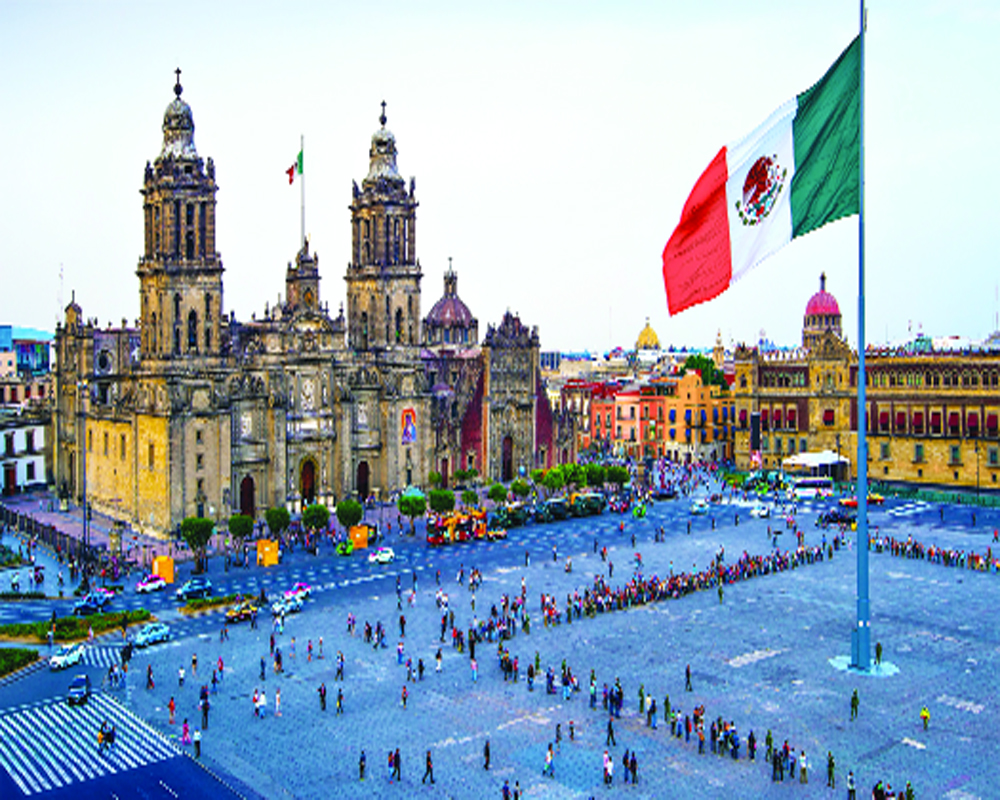The capital of the Aztec empire, Tenochtitlan, fell to the invaders after a long siege, and became Mexico City instead
Friday, 13 August, is the 500th anniversary of the Spanish conquest of Mexico. The capital of the Aztec empire, Tenochtitlan, fell to the invaders after a long siege, and became Mexico City instead. It was a major historical event, still mourned by millions and celebrated by millions more five centuries after it happened. But was it actually inevitable?
Laurent Binet doesn’t think so. The French writer’s novel ‘Civilisations’, which started winning prizes as soon as it was published in 2019, has now been translated into English and offers an alternate history in which the Incas and Aztecs conquered Europe. It’s fiction, of course, but it makes you think.
Binet starts 1,000 years ago with the Viking voyages to ‘Vinland’ (Newfoundland), an interesting historical fact that had no known impact on the rest of the world. But in Binet’s version a single band of Vikings sails all the way down the coast and up the Amazon River, finally conquering and intermarrying with a native Amerindian group.
This is the key plot device, because this stray Viking group not only gives the locals the technique for making iron tools and weapons. It also gives the native Americans all the Eurasian quick-killer diseases: smallpox, cholera, influenza, bubonic plague, typhoid, etc.
The first generations of local victims die in swathes, but by 500 years later their descendants have all the same immunities as Europeans. So, when Columbus shows up in the Caribbean in 1492, the local people are as well armed as his crew, they don’t fall ill, and they eat the European explorers for lunch (metaphorically, of course).
Then an exiled Inca ex-monarch in Cuba has his men reverse-engineer Columbus’s ships, builds some of his own, and sets out to Europe to see what he can conquer or steal. There follows a picaresque story in which a band of 300 Inca ‘conquistadors’ first overthrows the King of Spain and then, modestly reinforced by other Inca adventurers, takes over Italy, Germany and the Netherlands as well.
There’s plenty to amuse the casual reader. Francisco Pizarro, conqueror of Peru in fact, becomes the personal fixer of the Inca king Atahualpa, ruler of most of Europe. The Aztecs are horrified by the way that the Christians burn their human sacrifices (the heretics) alive rather than just cutting their hearts out like sensible people do. And so on.
The message seems to be that native Americans, given the opportunity, would have been slightly nicer and more enlightened imperialists than the Europeans who filled that role in the real history. Which may be true, but is not very relevant, since the whole scenario is entirely incredible.
Not much in history is inevitable, but the conquest of the Americas was. It might have been done by the Chinese or the Muslims rather than by the Europeans, but whichever of the older Eurasian civilisations reached the Americas first was bound to supplant the local, younger civilisations.
The problem was the sheer biological vulnerability of ‘New World’ populations to people coming from the ‘Old World’, and Binet’s device of having Greenland Vikings accidentally bestow immunity on the New Worlders 500 years before Columbus just doesn’t work. The then new Greenland settlements were so far from Europe, so small, and so rarely visited that they lacked lasting immunity themselves.
Moreover, their explorations in Newfoundland and around the Gulf of St. Lawrence were undertaken in the hope of finding some valuable resource that they could trade with Iceland and Norway in return for all the things they could not produce themselves.
As soon as the Greenland Vikings found something that filled the bill closer to home – walrus and narwhal ivory from Disko Bay on Greenland’s north-west coast – they shut the Newfoundland base down and stopped sailing westward. The idea that they could ever have reached the Caribbean, let alone the Amazon, is preposterous.
The New World’s population in 1500 was probably around 50 million people, mostly living in the big but relatively new mass civilisations. That population fell by about 90 per cent in the following century. So many farms were abandoned that the global temperature dropped (the ‘Little Ice Age’) as the forests grew back and absorbed enormous amounts of carbon dioxide.
What killed those 45 million missing people? Maybe one million died at the hands of the European invaders, but the vast majority fell victim to the Eurasian quick-killer diseases. If the Chinese had crossed the Pacific and reached the Americas first, the result would have been exactly the same. Those civilisations were doomed.
(Gwynne Dyer’s new book is ‘The Shortest History of War’. The views expressed are personal.)


























